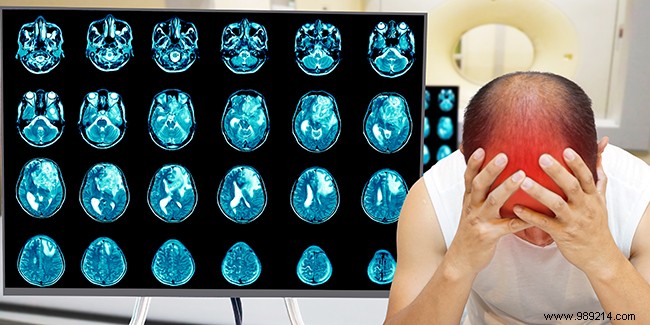
Strokes are very common:one every four minutes occurs in France, i.e. more than 140,000 cases per year, according to data published by the National Institute of Health and Medical Research (Inserm). It is a serious pathology caused by the rupture or obstruction of a blood vessel in the brain. Stroke can happen at any age, but the average age of people who have it is 74 years old. Because of the damage it can cause to the brain, a stroke is a medical emergency that requires calling the Samu immediately.
The acronym AVC stands for "Cerebrovascular Accident". In common parlance, the term "attack" is also often used to refer to a stroke.
A stroke occurs either when blood flow to or within the brain is interrupted due to a clogged blood vessel (or artery), this is called an ischemic stroke, or because a vessel ruptures, it then acts a hemorrhagic stroke.
A stroke is a medical emergency given the sequelae, which can be irreversible, that it can cause on the brain thus deprived of oxygen, but also because it can lead to death. Stroke is the leading cause of death in women, the second in men. 20% of people who have had a stroke die in the year following this pathology.
Because of the damage it can cause to the brain, stroke is also the leading cause of disability in adults and the second leading cause of dementia behind Alzheimer's disease.
The warning signs of a stroke are of different orders depending on the area of the brain that is affected, but they all appear suddenly.
Most commonly, because certain areas of the brain are more affected by a stroke, the telltale symptoms of a sudden onset stroke are:
The Association for Assistance to Patients and Families of Stroke Patients (France-AVC) sums it up well with an acronym (VITE ) the warning signs that should alert and push to act quickly:
In the case of symptoms of a stroke, it is essential to act quickly, even if the warning signs seem transient or diminish because they indicate, in this case, that one is in the presence of a transient ischemic attack. (AIT), a warning sign of the occurrence of a stroke in 5% of cases within 48 hours and in 10% of cases in the following month. As Inserm points out, "better to call wrongly than too late".
In the presence of warning signs, the first and only thing to do is therefore to call the Emergency Medical Aid Service (the Samu) by dialing 15 or the European emergency number, 112. Given the treatments currently used to treat a stroke, it is estimated that a few hours is the maximum time needed to provide effective medical care to a person who has suffered a stroke. The faster the care of the patient, the less the sequelae of a stroke are important.
While waiting for help to arrive, the SAMU regulating doctor on the phone will give you advice on how to deal with the person affected by a stroke:lay him down with a pillow under his head and do not move it until the arrival of the SAMU; note the time of onset of stroke warning signs; and gather the affected person's prescription medications, if possible, as well as the results of their most recent blood tests.
In all cases, when the occurrence of a stroke is suspected, the person concerned should not be given anything to drink or eat. In the same way, do not give him any medicine even if it is a usual treatment.
Most of the two types of stroke (ischemic stroke and hemorrhagic stroke) are related to arterial diseases. This is why it is important to screen for and treat vascular risk factors, i.e. those related to the blood vessels.
Thus, it is recommended to have your blood pressure checked regularly to detect possible high blood pressure, which is a cardiovascular condition, your cholesterol level, diabetes and heart rate.
Obesity, physical inactivity, excessive smoking and alcohol are also risk factors in the occurrence of a stroke.